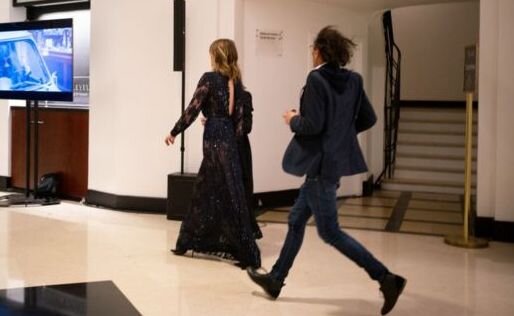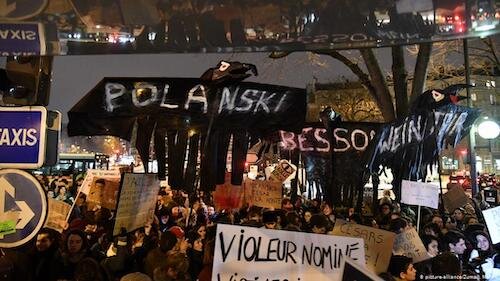A Response to the César Awards: Letting People Deal With Trauma in Their Own Way
It’s not news anymore. Adèle Haenel (Portrait of a Lady on Fire) stormed out of the 2020 César Awards after Roman Polanski won Best Director for his work on An Officer and a Spy. Polanski, obviously, has been the subject of conversation for decades, but especially within the 2010’s, as the world has begun to reevaluate the response to strong filmmakers with problematic backgrounds (or any worker in any profession). A world that was more accepting of Polanski, despite the statutory rape charge, is turning a new leaf, especially in 2020. The same director that won an Oscar for The Pianist is still being accoladed, only his success is being received very differently. Nothing has changed with Polanski himself. It’s the world that has transformed.
Haenel wasn’t the only person to have left the ceremony, and there were many boos throughout when he won. Polanski wasn’t at the Césars to accept his win, either. Once again, the Polanski discussion is brought up, but I think now is a better time than ever to put how I feel about this out there. How I feel matters to me and only me. What we need to realize in 2020 is that there is no perfect way to digest such a tricky discussion, particularly because it falls in a grey area. In that case, before I continue, we absolutely must learn to accept the different responses to something so controversial. We all have our own reasons. I wish to defend Haenel for her response, because anyone getting mad due to Polanski’s brilliant eye for directing is missing the bigger picture. This is a picture that encompasses all viewers and all head spaces.
A public outcry against Roman Polanski being celebrated at the César Awards.
For me, I try my best to separate the artist from the art. Roman Polanski has made many of my favourite films. The Pianist was a major turning point for me as a cinephile growing up. Chinatown is in my top films of all time. Repulsion, Rosemary’s Baby, Knife in the Water, et cetera. There are many films of his that I adore. There’s no question that he is great at making films. That’s not why Haenel stormed out of the ceremony, though. It wasn’t because Céline Sciamma lost. It’s because the moral compass of the Césars was lost, to people like Haenel (and, honestly, to someone like me too, despite my appreciation for his work). Haenel has publicly discussed the abuse she endured by director Christophe Ruggia (who has been arrested for this very case in January, with the case currently underway). She was the first French actress to discuss this kind of topic well after Hollywood begun its popular Me Too movement (years after, even). Polanski’s win was a confirmation for her: France isn’t penalizing sexual assaulters in its film industry.
So, let’s discuss Polanski. I know Samantha Geimer has long since discussed the case, and has even forgiven him (and kept in touch with him in the twenty first century). I know this was the only charged case, and that it didn’t happen to other minors (or people). I know the movement to “free” Roman Polanski was more to do with the case’s judge changing his verdict at the last second (which made Polanski flee out of the United States), and less to do with Polanski’s actual atrocity. Does that make any of this okay? You may think he has served his time. In a way, he has. He’s been exiled out of the film industry he was dominating, and churning out classics with. He forever has this asterisk next to his name. However, that’s on him. Just because you can see past this to enjoy his works, that doesn’t mean everyone else can. It all depends on how you prioritize his legacy: as an artist, or as the man that changed one child’s life forever in a monstrous way. If your response is that Geimer was fine with this exchange when it happened, allow me to remind you that narcotics were involved, and to look up what “statutory rape” means (and why we have age laws). The truth is she wasn’t fine with this. She was upset, and confiding in her boyfriend at the time the day after (her mother overheard this conversation and called the police). Geimer was drugged. End of story.
Adèle Haenel’s response after Roman Polanski’s César win.
For the rest of his life, Polanski will have some crowds championing him for his work, and others never letting go of his past. To me, that’s what you have signed up for the moment you decide to take advantage of anyone who isn’t able to properly display complete consent, especially a minor. Other people doing similar things in the ‘70s doesn’t make any of this okay, either. None of it is. There’s no “PC agenda” here. I don’t believe in forcing politics down anyone’s throats, especially as a film journalist. I think everyone should have a say. Haenel’s say was that there are other powerful films produced in France not made by someone who has exhibited predatorily tendencies and actions. As someone who has been scarred by abuse, and has survived to tell the tale, this is a loss for her. This is a loss for many.
Does Polanski deserve filmmaking awards nowadays? I guess it depends on how the panel feels about whatever current film he has made. Don’t shut down those that aren’t okay with him. You can have your opinion, and they can have theirs. People like Haenel are not the perpetrators here. Again, this is what people sign up for the second they go through with something as disgusting as sexual assault or statutory rape. Their legacy is tarnished? That’s on them. Everyone makes mistakes, but there’s a difference between saying something out of anger, or not thinking straight, and strategically grooming someone to the point of doing something graphic and against their wishes (or forcing them to against their means). Even if Polanski did it once, he still did it. Some people can’t forget that, more on behalf of whomever it happened to (Samantha Geimer in this case).
A tarnished legacy is forever tarnished. If you can separate what Polanski did as a person from what he’s done as a director, then that is okay. To some, the two cannot be divided. Let people deal with this in their own way. Apologizing for a filmmaker on behalf of the body of their work is demoralizing, and condescending to those that put human behaviours before the luxury of art and entertainment. We need to be championing voices that have been silenced for so long, not dismissing them for our own selfish reasons. We can’t control what an awards panel will decide, but we can choose how we respond to others’ decisions on such a complicated matter. I suggest we stand back and listen. We should have been this whole time, but we especially now — with all that we know, and our current resources — absolutely must listen. If we’re not censoring artists and their right to create, we shouldn’t censor the responses of survivors or those that oppose heinous crimes.
Andreas Babiolakis has a Masters degree in Film and Photography Preservation and Collections management from Ryerson University, as well as a Bachelors degree in Cinema Studies from York University. His favourite times of year are the Criterion Collection flash sales and the annual Toronto International Film Festival.



